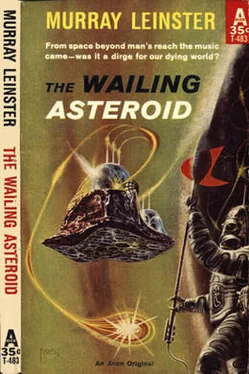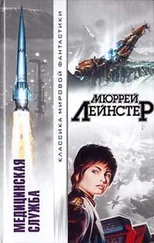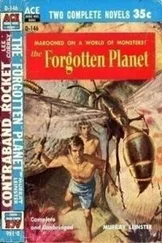There were lights inside this room, as everywhere else they had explored. But it was nearly impossible to see any distance. This was an extremely long room, and it contained racks of metal which reached from floor to ceiling. Each rack was a series of shallow metal troughs, and in each trough there was a row of crumbly black metal cubes, very systematically arranged. Each side was about three inches square, and they were dull black, not glistening at all. They filled the racks completely. There were narrow aisles between the rows of racks, through which Burke could make his way easily enough, but which a more portly man might have found inconvenient.
He stared at a trough, and was stunned. He picked up one of the cubes, and immediately recognized the object in his hand. It was a dull–black, smudgy cube exactly like the one his uncle had brought back from the Cro–Magnon cave in France. He knew that if he dropped this object—found two hundred seventy million miles from the other one—it would split into thousands of tissue–thin, shiny pieces.
He did drop it. Deliberately. And it shattered into layers which lay like films of mica on the floor.
For no clearly understandable reason, Burke found that his flesh crawled. He had to force himself to stay in this room with so many thousands of the enigmatic cubes. There had been a cube of this kind on Earth. The one he'd known as a child had belonged to a Cro–Magnon tribesman ten thousand, twenty thousand, how many years ago? And it could only have come from this asteroid. Which meant—
Presently he made his way back to the spaceship. He carried one of the cubes, rather gingerly. He meant to show it to Sandy. But the implications were startling.
Members of the garrison of this fortress, thousands of years gone by, had visited Earth. One of them, doubtless, had carried that other cube. Why? When the garrison abandoned the asteroid they left these cubes behind. They left behind intricate machinery to call them back. They left squat machines and ten–foot globes which must be weapons. They left nothing that would be useful in the place to which they had removed. But they'd left these cubes, hundreds of thousands of them.
The cube, then, could be anything. It could be impersonal, like equipment for the fortress that would be useless elsewhere. The fortress' equipment was designed to deal out death. Were the cubes? No. Burke had owned one without damage. When that cube split into glistening, tissue–thin plates, no one was injured. To be sure, there was his dream. But the cube wasn't a weapon. Whatever else it might be, it was not dangerous.
He went into the spaceship and for no reason whatever firmly locked both air–lock doors. Holmes and Keller were asleep. There was no sound from the lower compartment occupied by Sandy and Pam.
Burke put the black object on the control–desk. The single cube on Earth had been meaningless. The museum which joyfully accepted Cro–Magnon artifacts from his uncle had dismissed it as of no importance. It was fit only to be given to an eleven–year–old boy. But a roomful of such cubes couldn't be without meaning!
He dismissed this newest mystery with an almost violent effort of his will. It was a mystery. Yet there was no intention to have the fortress seem a mystery to whoever answered its call to space. He could guess that the signals were notification of some emergency which needed to be met. The automatic apparatus of the ship–lock was set to aid those who came in response to the call. But everything presupposed that those who came would know why they came.
Burke didn't. The thing must be simple, an explanation not yet thought of. But there was nowhere to start to think about it! His recurrent dream? No. That was as mysterious as the rest.
Burke was very, very lonely and depressed. He could look for no help in solving the mystery. Earth was now past the point of conjunction with M–387, and moved nearly a million miles a day along its orbit, with nearly half of them away from the fortress. At the most hopeful estimate, it would be three months or later before an emergency space fleet of replicas of his own ship could lift off from Earth for here.
And Burke was reasonably sure that the red sparks would have reached the center of the disk in much less time than that. If it were in some fashion like a radar, making a map of the surroundings of the asteroid, the observer's place would be in the middle. In that event, whatever the red sparks represented would reach the fortress before more ships came out from Earth.
He sat with his chin on his chest, wearily debating the impossibility of meeting a situation in which all humanity might well be involved. His achievement of space travel provided no sense of triumph, and the discovery of the abandoned fortress produced no elation. Not when a desperate emergency requiring a non–existent garrison to report for duty was so probable. Burke sat in the control–chair and could find no encouragement in any of his thoughts….
* * * * *
He heard a trumpet–call and was on his feet, buckling familiar equipment about him. There were other figures all around in this bunkroom, similarly equipping themselves. Some grumbled. There was a rush for the doorway and he found himself one of a line of trotting figures which swung sharply out the door and went swiftly down one of the high–ceilinged corridors. The faces he saw were hardbitten and resentful. They moved, but out of habit, not choice. There were other lines of men in motion. Some rushed in the same direction. Others ran stolidly into branching corridors and were lost to sight. Up a ramp, with the pounding of innumerable feet filling his ears with echoed sound. Suddenly there were fewer men before him. Some had darted through a doorway to the right. More vanished. He was at the head of his line. He turned into the doorway next beyond, and saw a squat and menacing object there. He swung up its side and seated himself. He dropped a helmet over his head and saw empty space with millions of unwinking stars beyond it. He waited. He was not Burke. He was someone else who happened to be the pointer, the aimer, of the weapon he sat astride. This might be a drill, but it could be action.
A voice spoke inside his helmet. The words were utterly strange, but he understood them. He tested the give of this lever and the response of that. He spoke crisply, militarily, in words that somehow meant this—a word missing—was ready for action at its highest rate of fire.
Again he waited, his eyes examining the emptiness he saw from within his helmet. A star winked. He snatched at a lever and centered it, snapping sharp, bitten–off words. The voice in his helmet said, "Flam!" He jerked the firing–lever and all space was blotted out for seconds by flaming light. Then the light faded and far, far away among the stars something burned horribly, spouting fire. It blew up.
Yet again he waited. He doggedly watched the stars, because the Enemy had some way to prevent detection by regular instruments, and only the barest flicker of one among myriad light–specks could reveal the presence of an Enemy craft.
A long time later the voice in his helmet spoke again, and he relaxed, and lifted the helmet. He nodded to the others of the crew of this weapon. Then a trumpet blew again, and he dismounted leisurely from the saddle of the ungainly thing he'd fired, and he and his companions waited while long lines of men filed stolidly past the doorway. They were on the way back to the bunk–rooms. They did not look well–fed. His turn came. His crew filed out into the corridor, now filled with men moving in a bored but disciplined fashion. He heard somebody say that it was an Enemy scout, trying some new device to get close to the fortress. Eight weapons had fired on it at the same instant, his among them. Whatever the new device was, the Enemy had found it didn't work. But he knew that it needn't have been a real Enemy, but just a drill. Nobody knew when supposed action was real. There was much suspicion that there was no real action. There was always the possibility of real action, though. Of course. The Enemy had been the Enemy for thousands of years. A century or ten or a hundred of quietude would not mean the Enemy had given up….
Читать дальше







